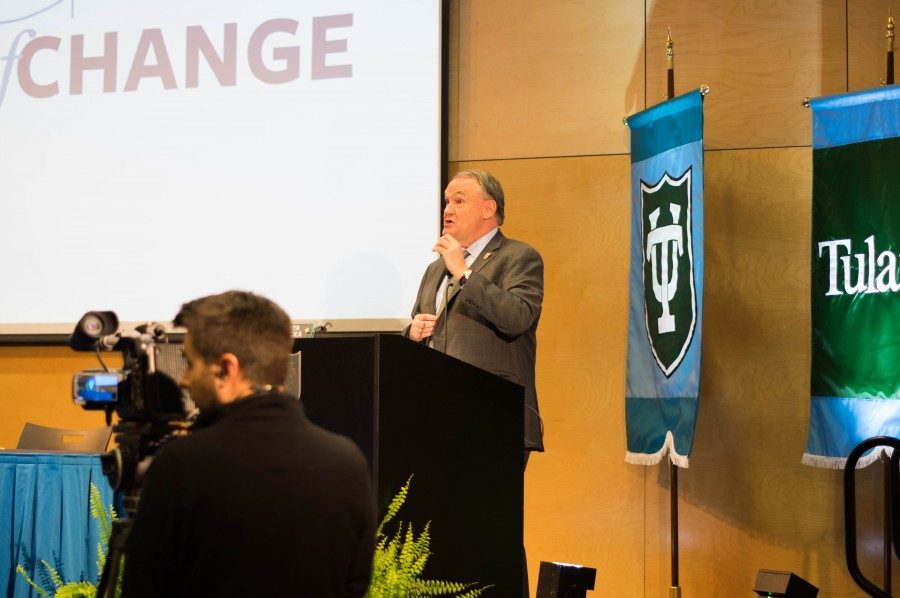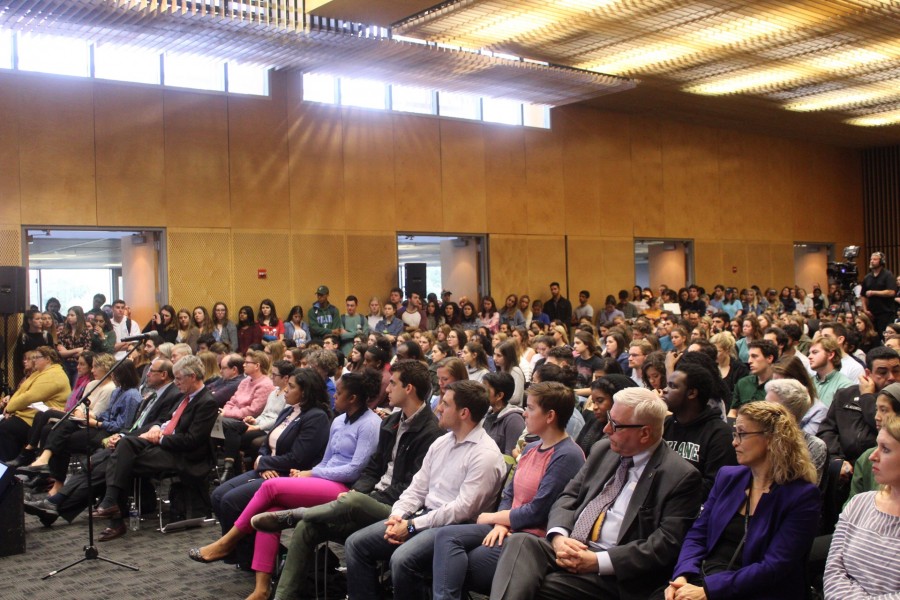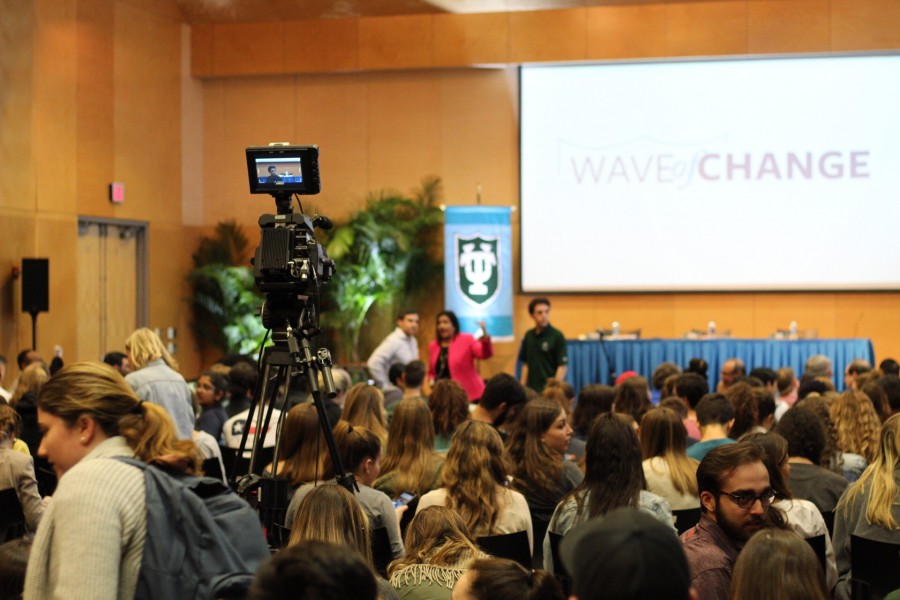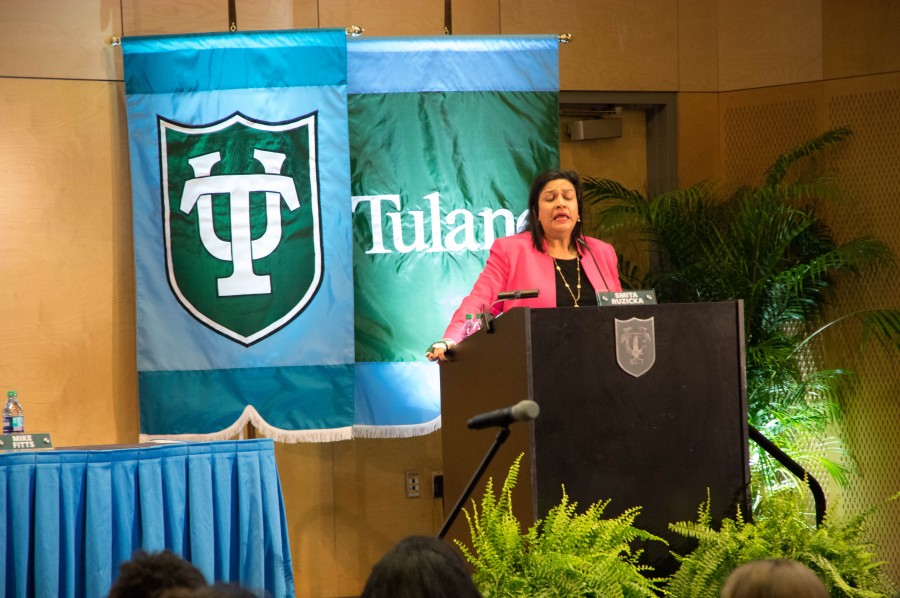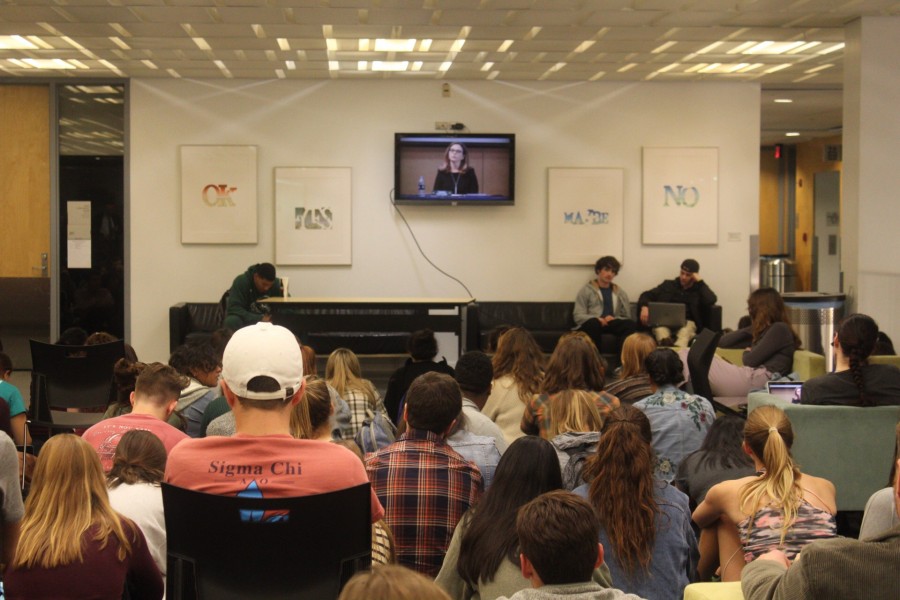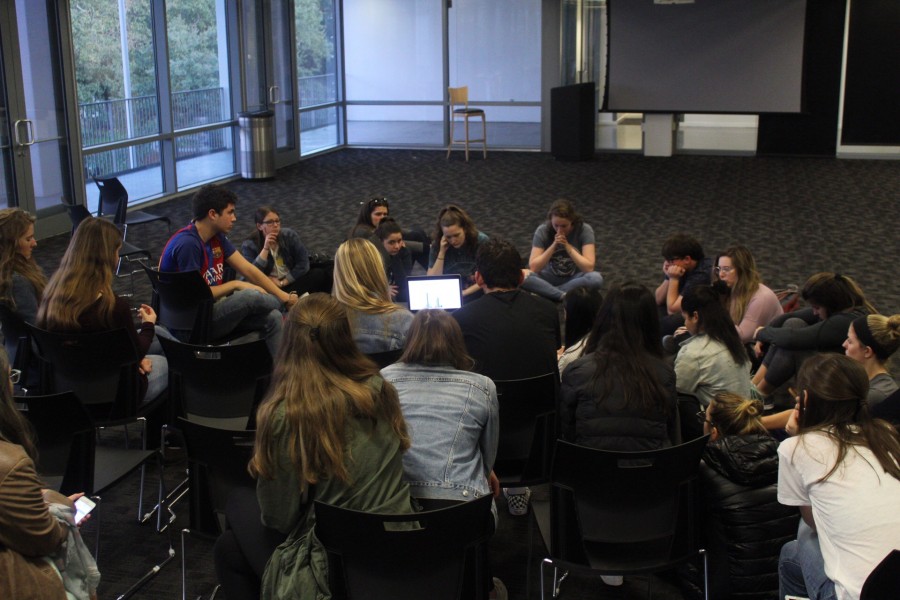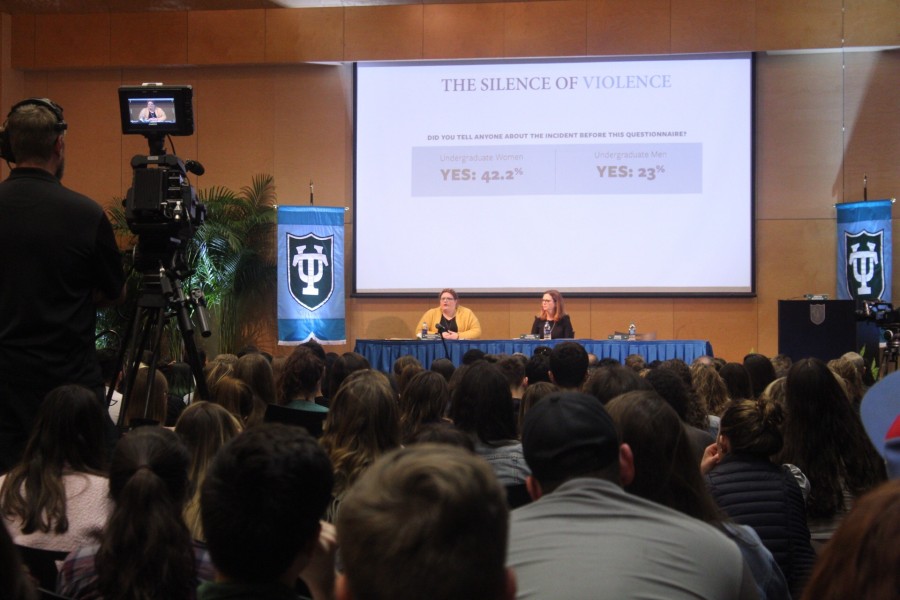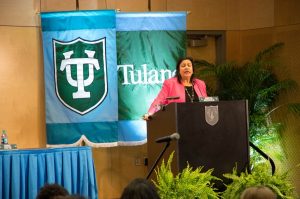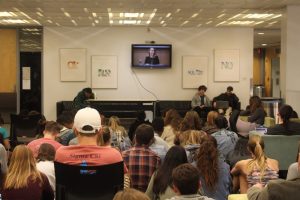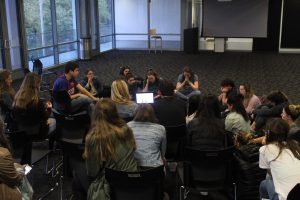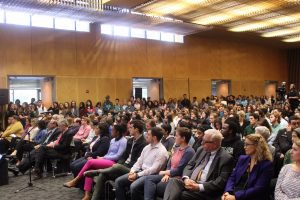Marginalized communities respond to sexual assault climate survey results
Avery Fiftal | Staff Photographer
A 2018 photograph of President Mike Fitts at a prior sexual violence town hall as part of the “All In” campaign at Tulane University.
After five months of waiting and speculating, students gathered to hear the results of the Sexual Assault Climate Survey.
The doors of Kendall Cram Lecture Room opened at 4:30 p.m. By 4:39 p.m. all 400 seats were taken. Beginning at 5 p.m. and going more than an hour over its scheduled end time, the town hall last Wednesday night solicited an audience that filled the auditorium and an overflow room next door.
The data showed that since enrolling at Tulane, 41 percent of female undergraduates and 18 percent of male undergraduates reported being sexually assaulted. Of those reporting, 51 percent of LGBTQ+ women and 23 percent of undergraduate women of color reported being sexually assaulted.
In the week following the release of the climate survey data, students have been speaking out about their concerns and discussing steps moving forward.
“I chose for this school, this campus, this city to be my home for four years, and I chose it with the understanding that I would feel safe for those four years,” Sophie Fraser, Undergraduate Student Government Multicultural Council chair, said.
Some students said they were dissatisfied with what they perceived as a lack of transparency surrounding the data, the disproportionate statistics for the LGBTQ+ community and the response to concerns of students of color.
Advocating for Partnerships
Public Health Professor Gretchen Clum and Nick Fears, president of the graduate and professional student association, were initially tasked with analyzing the data in May of 2017.
“We realized it was going to take longer than we thought it was going to, especially because we knew, to make sure we did it right, we needed it to be validated by external analysts,” Fears said.
After finishing their analysis in August, Clum and Fears sent out the data for a peer review. The results were initially expected to be announced at Shifting the Paradigm in September but were postponed until Jan. 31, leading to the release of the #WeMatterTU petition.
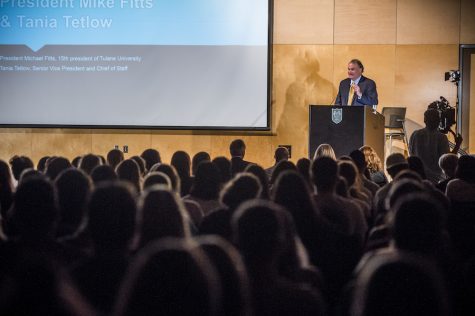
President Mike Fitts addresses the crowd at the Shifting the Paradigm event in September.
In the meantime, a task force was formed, consisting of students, faculty members and staff. Task force members were not able to see the actual data, which led to frustration among participants.
Several students stepped down from the task force, and others expressed that they felt tokenized, that it was ineffective and that their voices were not taken seriously.
Administrators say they recognize a student desire to be engaged and are working to provide those opportunities.
“We walk a fine line between wanting very much to honor students’ desire to have grassroots efforts on their own while still trying to do everything we can to facilitate those efforts,” Tania Tetlow, senior vice president and chief of staff, said.
Many student activists have advocated for a partnership where their work is not exploited and where they are listened to and supported.
Some frustrations, however, stem from activists on campus who say they have been working and expressing ideas before the climate survey was launched.
“We aren’t just sitting around waiting for the administration to come to us. We have been coming to you, telling you that these are the issues that we are facing, and we want you to work with us,” Abi M’baye, member of the African American Women’s Society, said.
One in Two
The group most disproportionately affected was the LGBTQ+ community with 51 percent of LGBQ+* female undergraduates and 44 percent of LGBQ+ male undergraduates reporting that they had been sexually assaulted. Students in the LGBTQ+ community expressed disappointment in the lack of research and engagement.
“For [the administration] to say they are still puzzled by why this is happening, I think [they] just need to talk to people,” Sam Beale, president of the Queer Student Alliance, said. “I think most queer people on campus could give you some semblance of an answer of why this might be happening.”
The report categorized transgender students under the gender and sexual orientation with which they identify. A total of 0.7 percent of students who took the survey identified as genderqueer, gender non-conforming or another non-binary gender, which the report states was not enough to assign appropriate weighting to this subset.
“I understand the need to have a large enough sample size for statistically significant data, but I really think because the rates of violence against trans people are so magnified compared to the violence against cis people, it would be really, really helpful to have data that is specific to trans people if we’re going to plan any intervention on this campus,” Cory Cole, vice president of queer sorority Gamma Rho Lambda, said.
Despite being disproportionately affected by sexual violence, members of the LGBTQ+ community expressed not feeling supported by administration.
“I chose for this school, this campus, this city to be my home for four years, and I chose it with the understanding that I would feel safe for those four years,” Sophie Fraser, Undergraduate Student Government Multicultural Council chair, said.
When asked in the survey if the institution would support the person making the report, 48.8 percent of LGBTQ+ students responded “likely” or “very likely” compared to 68.9 percent of heterosexual students.
Many LGBTQ+ students rally around the idea of celebrating and creating visibility for the LGBTQ+ community.
“If you want diverse students, whether it be students of color or queer students, you also have to celebrate them,” Pearl Dalla, USG Gender and Sexual Diversity chair, said.
Healing Broken Trust
According to the Sexual Misconduct Climate Survey, 23 percent of students of color reported having been affected by sexual violence on Tulane’s campus. Though this number is lower than white respondents, some students of color reported that a general feeling of mistrust with the administration is a probable cause for the lack of reporting.
“I’m a Muslim student on this campus,” Zahra Saifudeen, Muslim Student Association secretary, said. “I’m a woman of color on this campus, and I feel like they didn’t acknowledge that we have lower rates of reporting because of certain reasons.”
Many students of color said they feel unrepresented by the lack of diversity in the administration and Title IX office.
“I think the biggest thing is that when you don’t see someone who represents you, and students said this during the town hall, it’s hard to feel comfortable,” Sonali Chadha, USG director of diversity and inclusivity excellence, said. “It’s hard to want to go talk to someone. It’s hard to think that someone is an ally when they haven’t done anything in the past or completed actions to prove that they are an ally.”
Results released: The percentage of undergraduate women who report sexual assault is 41%. The percentage of undergraduate men who report sexual assault is 18%.
— Hullabaloo News (@hullnewsTU) January 31, 2018
“Queer students are at the highest risk in our community and it’s time to recognize that,” Smith said.
— Hullabaloo News (@hullnewsTU) January 31, 2018
Outraged student continues asking questions off-mic: “You’re probably wrong, we’re not going to have a conversation about this next semester,” student said.
— Hullabaloo News (@hullnewsTU) February 1, 2018
Smith responds to safety concerns: “This is horrible, this is terrible, and this is why we do the work, this is why we come to work… You deserve better” Smith said, choking back tears.
— Hullabaloo News (@hullnewsTU) February 1, 2018
President Mike Fitts pointed to a list of actions he has taken since he took office, especially highlighting the Presidential Commission on Race and Tulane Values.
“[Marginalized communities] need all sort of not only substantive support, but also symbolic support, and so we created the Office of Academic Equity,” Fitts said. “We have expanded support for the O, and we also try and talk about the importance of this. And that gets at the cultural issues that nobody in this society has solved, but we have to be focusing on it continuously.”
Some members of the Tulane community said they are concerned that Tulane may not adequately teach about the histories of race and racism, a deficit they said could potentially erode efforts to comprehensively address sexual violence.
“This university does celebrate the legacy of slavery and the abuse of black women who were a lot of times forced to bear children for the system of white supremacy,” M’Baye said. “This institution celebrates that because buildings like Gibson, Hebert … are named after people who were involved in the business of slavery or who benefited from it.”
The Action Plan
The administration proposed an action plan at the end of the Wave of Change Executive Report.
The plan includes sections on integrating sexual violence prevention in the Tulane experience, addressing issues of race, gender and sexuality, establishing means for student engagement, expanding community support for survivors and outlining a plan for evaluation and research.
“We’ve really doubled down on a whole group of new initiatives which are fundamentally intended to raise awareness on campus, whether it’s with residential advisors, orientation, rush, fraternities, classes — a series of things that will change the conversation,” Fitts said.
The administration stresses the need for students to take charge in the effort to solve the problem and change the culture on campus. Student activists said they will continue working to tackle sexual violence and promote social justice on campus, despite their concerns.
“We’re not doing this work so we can feel happy. We’re doing this work so the next generation can feel comfortable on this campus,” Bubba Murray said.
*This was the term used in the Wave of Change Executive Report.
Students submitted letters to the editor, responding to the release of the report.
Your donation will support the student journalists of Tulane University. Your contribution will allow us to purchase equipment and cover our annual website hosting costs.



